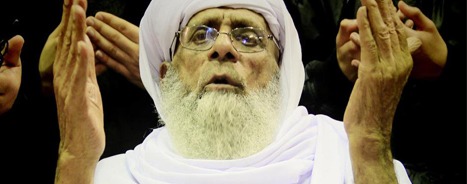A Service to Humanity

Dedicating his life to the service of his religion and the community, Sufi Abdullah Khan Sahib’s legacy, commitment and loyalty was clear to see. The 15,000 people that came to pray tribute to him at his funeral was evidence of how much of an esteemed individual he was. His numerous charity projects, educational establishments and religious beliefs propelled him to continue the work that he set out to do. Speaking to The Asian Today, Sufi Sahib’s grandson, Abdul Hafeez, said his work was never finished, there was always more to do.
“Working nightshifts six days a week in the foundry, he would teach the Quran and serve his community by offering advice on religious and spiritual matters during the day. The doors were open to everyone, not just to Muslims. People would come and ask for guidance, and Sufi Sahib would always help, he made time for everyone”.
Born in 1923 in Behkri, in the district of Chakwal, Punjab, he was educated in Pakistan and went on to enlist into the British Indian army at the age of 16.
Whilst serving in the army during World War 2, he was captured in Libya by the German forces and taken to Germany where he was kept as a prisoner of war for about two years. He was within a small group that managed to escape and they ended up in a jungle in France and with the help of a French woman were able to find a British army camp where they reported and asked to be returned to their own country. Heading back, Sufi Sahib served in the army up until 1962.
Thinking about his next step after completing his service in the army, he thought about leaving for the UK, like most south Asian families, as that happened to be the most popular decision.
After speaking to his spiritual guide, Zinda Pir Sahib, he gained permission to leave. He was asked to go to the UK to further the message of Islam and it was in April 1962 that he migrated to Birmingham.
After a couple of weeks, due to the lack of religious resources, he established a small Dhikr gathering and started Friday prayers at his home.
Son, Sufi Javed Akhtar said, “At a time when nobody knew the direction to pray, he brought with him a sense of calm. It was a really difficult task – to keep devoted to your faith, along with spreading the message of Islam.”
Public faith grew and thus the first Islamic jaloos was established in 1973 in the form of a Milad procession organised and led by Sufi Sahib. Chanting through the streets of Birmingham, the parade is accredited as the first of its kind in the UK.
Supplementary classes for children and the Dhikr circle grew rapidly whilst at his residence on Warwick Road, as Sufi Sahib touched the hearts of those he encountered, he soon realised the space was too small.
It was in 1983 that Dar ul Uloom Islamia was established on Golden Hillock Road, Small Heath. A disused factory hall with the capacity to accommodate around 700 worshippers was bought. A community centre was built next during the late 1980’s and in a quest to seek land for a car park, the present site where Central Jamia Masjid Ghamkol Sharif is located was purchased.
Reminiscing about the time, Sufi Javed said, “Raja Saleem Akhtar, on behalf of the Masjid Committee, met with West Midlands County Council and we were offered the land at a third of its price if we were to build a Masjid”. The foundation of the Masjid was put down in 1992 and the project was completed within 4 years.
“There was no shortage of funds. People have been very generous and opened their pockets whenever they could and contributed openly. We would never stop work, whatever the weather; we would show up to build. It was for the need of our community, so we built it. Also, there are a number of other community initiatives, such as funeral service, community centre, accommodation for those with mental health issues, education centre, children’s centre and an Academy in conjunction with South & City College.”
It was his relationship with his spiritual teacher, Zinda Pir Sahib, which ultimately defined his own character. Both met in 1945 during their army years and instantly bonded. Sufi Sahib would spend his entire leave serving Zinda Pir Sahib in Ghamkol Sharif. Once Sufi Sahib came to the UK they would meet on an annual basis during Hajj. Zinda Pir Sahib travelled from Pakistan and Sufi Sahib from the UK, this became a regular practice for the best part of 25-30 years.
“If you would ever see Sufi Sahib in the company of his spiritual guide, he would be at his feet, no different to anybody else – he made it evident to his own followers that they should treat him the same as anyone else. ‘Although you are my followers, don’t hold me in such high regard, when Pir Sahib is present, I am like one of you. In 1999 when his Pir Sahib passed away, Sufi Sahib had the honour of leading the funeral prayer in Ghamkol Sharif, Kohat, Pakistan.”
Abdul Hafeez added, “The love that Almighty Allah has placed in the hearts for Sufi Sahib is the reason that 15,000 people came to pay their respects. He had an impact on the lives of so many”.
“Through the interaction that they had with Sufi Sahib over the years, seeing his work, his practical life, his characteristics, his personality, his manners and his etiquette, it drew them to closer to Islam and reverts into the fold of Islam”.
“It’s a service to humankind, a duty upon us all. That’s the example he set and that’s the example he leaves behind. The doors of the Masjid and the Darbar are open to all of Almighty Allah’s creation.



































